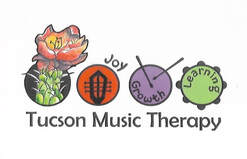What is music therapy?
Music therapy is both an allied health profession and field of scientific research that uses music as a therapeutic tool to achieve specific, non- musical goals. A music therapist uses music, and the relationship that develops through shared musical experiences, to support an individual in improving cognitive functioning, motor skills, emotional and affective development, or behavior and social skills.
What are the qualifications of a music therapist?
Music Therapists hold undergraduate and/or graduate degrees in music therapy and complete at least 1200 hours of clinical training to become eligible to sit for the national board certification exam. Music therapists must pass the exam to earn the Music Therapist – Board Certified (MT-BC) credential and must maintain their status through continuing education or re-testing.
What are some goals that can be addressed in music therapy?
- Improve fine and/or gross motor skills
- Increase attention span
- Increase on-task behavior
- Decrease repetitive or self-stimulating behaviors
- Improve daily living skills
- Improve body awareness
- Improve emotional self-regulation skills
- Enhance language development
- Improve sensory perception and sensorimotor integration
- Demonstrate understanding of basic academic and pre-academic concepts
- Promote self expression and creativity
- Decrease anxiety and/or hyperactivity
- Improve social skills
- Enhance positive self-concept
Who is music therapy for?
Music has potential to reach many people. Some individuals may particularly benefit from music therapy, including individuals with:
- Autism Spectrum Disorders
- Cerebral Palsy
- Down Syndrome
- ADD/ADHD
- Reactive Attachment Disorder (RAD)
- Posttraumatic Stress Disorder (PTSD)
- Intellectual Disabilities
- Developmental Delays
- Speech Impairments
- Mental Health Diagnoses
- Traumatic Brain Injury
- Anxiety and Stress-Related Issues
- Asthma or COPD
- Terminal illness
Proudly powered by Weebly
